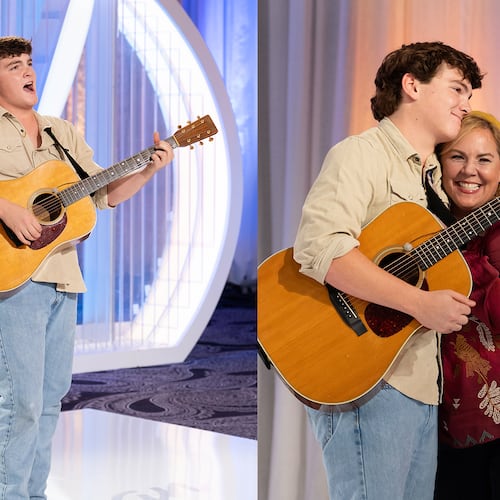WSB-TV chief meteorologist Glenn Burns is retiring next month after almost 41 years at the station.
His final day is scheduled to be Tuesday, Nov. 22.
Brad Nitz, 53, who joined the station in 2006 and has been on broadcast TV since the early 1990s, will take over as chief meteorologist. Burns, now 70, said he will remain on retainer at the station as “Chief Meteorologist Emeritus” and plans to contribute commentary during serious weather events.
Burns joined Channel 2 Action News in 1981 and became chief meteorologist in 1986.
“I have done everything I set out to do,” Burns said in an exclusive interview with The Atlanta Journal-Constitution. “The main reason is to give back to my family that sacrificed so much while I am still healthy and able.”
Credit: arvin.temkar@ajc.com
Credit: arvin.temkar@ajc.com
Burns ― married for 47 years to Susan with two adult children ― has covered hundreds of tornado watches and severe thunderstorms as well as the stray winter snowpocalypse. “Weather has gotten more peculiar over time,” he noted, though he said he still gets pushback from some viewers on social media when he brings up climate change in any meaningful way.
He said he has also seen weather forecasting improve over the decades, courtesy of better computer models and tracking equipment. When he arrived at WSB, he could only feel truly confident of his forecasts 48 hours in advance. Now he said he can offer predictions five days out and rarely make a mistake.
Credit: WSB-TV
Credit: WSB-TV
He is the last to leave WSB-TV from what was dubbed the “Fab Four” news team from the 1990s and 2000s which also included John Pruitt, Monica Pearson and Chuck Dowdle. (Coincidentally, all four gathered at WSB headquarters Wednesday night at an event promoting Pruitt’s new historical fiction book “Tell It True.”)
Burns, who has spent four-plus decades in landlocked Atlanta, grew up in Fort Lauderdale by the beach and became an adept surfer. “I have always loved the ocean,” he said. “The breeze, the salty air. There’s nothing like it.”
He said his interest in weather was piqued at age 15 when he was on the beach during a thunderstorm and lightning hit so close to him, he felt the shockwave.
Burns earned a journalism degree at the University of Florida in 1975 and landed his first job as a reporter at a West Palm Beach TV station. He loved reporting science stories and after the chief weatherman was fired, he stepped in at age 24.
One week into his new stint, he recalled finishing the 6 p.m. newscast and seeing a young child run into the lobby yelling that his dad had fallen over the seawall into the ocean.
Instinctively, Burns said he took off his jacket and shirt and jumped in to hunt for the submerged man. “It was freaking cold,” he said. “It was dark. The water was 20 feet deep. I’m flailing around making dives going up and down. On my fourth trip down, my foot hit the man’s face. I grabbed him. He was like 300 pounds. I yanked him up. My lungs were going to explode, but I got him to the surface and people were able to pull him out. I did CPR and he survived.”
After nearly three years in West Palm Beach, he landed a TV weather job in Minneapolis, where he also received a master’s degree in astrophysics from the University of Minnesota and earned enough credits to become a certified meteorologist. He wasn’t thrilled by the cold weather and after another two and a half years, he eagerly said yes when WSB-TV offered him a job in Atlanta in early 1982.
“When I left Minneapolis, the wind chill was 65 degrees below zero,” he recalled. But Atlanta was in the middle of its own “snow jam”: four inches of snow and freezing rain. “The city was in mayhem,” he said. “The forecasts hadn’t been good. My goal from then was not to make a mistake like that again.”
Burns said his forecasts were on point during snow storms in 1993 (30 inches!) and 2014, when people were stuck on icy roads so long they abandoned their vehicles. Cities and counties did not properly pre-treat highways with brine to keep them from freezing, he said, although he believed he made proper predictions. He said officials in the area now have better protocols to keep that from happening again.
In 2016, Burns began having shortness of breath on air. Doctors found a significant leak in one of Burns’ aortic valves and he had open-heart surgery so a surgeon could insert a replacement valve. He said he was worried he’d have to retire but was able to come back as strong as ever.
Pearson, his former colleague, enjoyed his approach to weather because he “gave you the information in a calm, reassuring way with no histrionics or scare tactics.”
After all these decades, Burns said he never gets tired of weather. Even on days when there’s not a cloud in the sky, he tries to impart weather facts and scientific knowledge to the audience. As Pearson noted, “he taught you weather through his daily segments, from the cloud formations to instructions on what to do if you get caught in your car during a tornado. Glenn at his heart is a scientist.”
Pruitt marveled over Burns’ equanimity no matter what was happening. “I’ve never seen Glenn lose his temper or get angry or say a discouraging word to anybody,” he said. “He’s remarkably consistent the way he lives his life and does the weather.”
And as Burns gets ready to do his final weeks of forecasts, he said he has nothing but gratitude for his family. “My wife and kids get so much credit for being so patient,” he said. “This is such a demanding job. There are no good hours. I left them in the lurch so many times when there was bad weather.”
Despite owning a fishing boat in Florida and snorkeling when visiting family in West Palm Beach, he has no plans to leave Atlanta. “I love the change of seasons,” he said. He has an abiding interest in space and owns a telescope with plans to focus on astrophotography. He also would like to teach.
As for his final day on air as chief, Burns isn’t sure what he is going to say: “I usually ad-lib but I may take some notes because I have so many people to thank.”
Credit: arvin.temkar@ajc.com
Credit: arvin.temkar@ajc.com
About the Author
Keep Reading
The Latest
Featured






